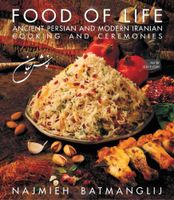Label
All
0
Clear all filters
Prue Leith's latest book is now on ckbk. Get 25% off ckbk Membership
Desserts, Pastries & Candies
Appears in
Published 2011


The word “dessert,” comes from the French verb desservir, meaning to clear the table of what has been served. The word was first introduced in France in the sixteenth century to mean what was served after the main meal had been cleared away. It was usually spiced wine and fresh or dried fruit, crisp thin wafers, or candied spices or nuts. However, the concept and the tradition of serving wine accompanied by a sweet course after the main meal goes back over 2,500 years to the ancient Persian royal courts. Persians believed that finishing the meal with sweets helped the digestion. Herodotus mentions: “The Persians believe that the Greeks finish their dinner still hungry because they don’t have any worthwhile desserts [‘epiphorēmata’].” According to the Stanford professor and linguist Daniel Jurafsky, “it was the Persians whose love of desserts was the impetus that eventually changed these simple wafers and nuts into our modern desserts.”
In this section
Advertisement
Advertisement
The licensor does not allow printing of this title


